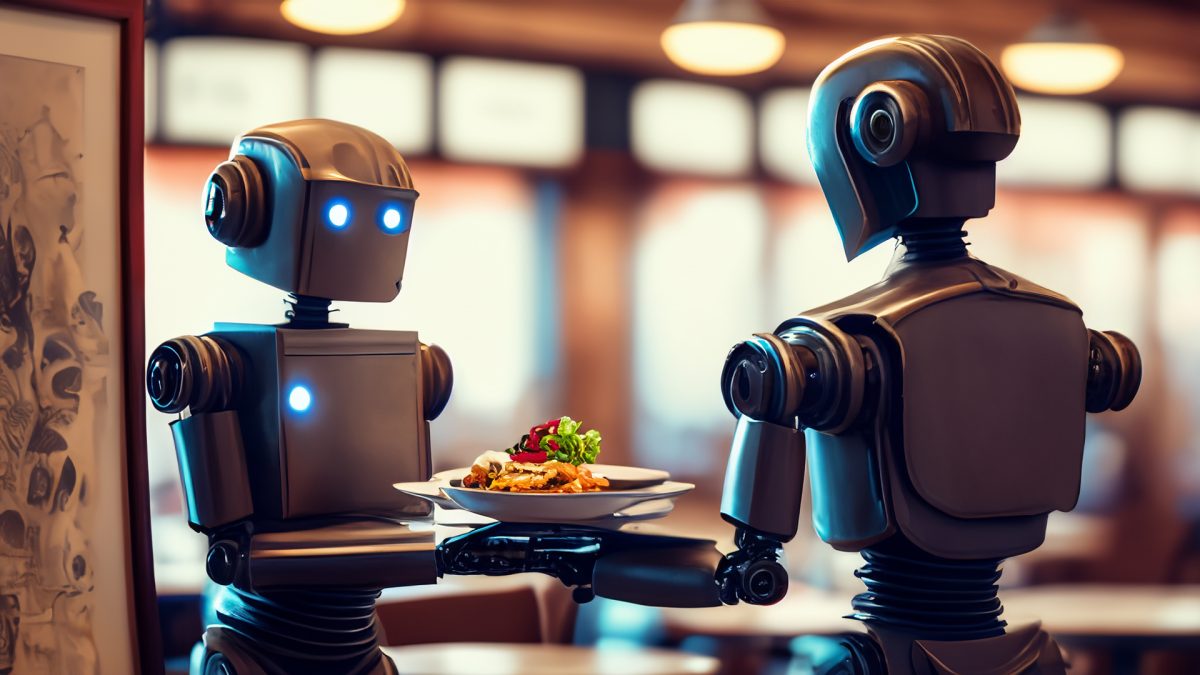[ad_1]
Diners in India are extremely hard to appease. More than just dishes that taste phenomenal and look Instagramable, they want something unique. More than anything else, the experience of going out for a meal has to deliver on some really high expectations. Enter robots in the dining and hospitality industry.
The next time you are out for a meal at a new, high-end restaurant in India, don’t be surprised if a robot comes up to take your order, and perhaps even act as your waiter. Chances are, that they were set up by an Indian company, Alphadroid.
If 2023 was the year of AI, 2024 is set to be the year of robotics. From Figure’s Figure 01 humanoid robot, Tesla’s Optimus and practically everything that Boston Dynamics does, robots certainly are becoming very exciting, and dare we say, mainstream. Even NVIDIA plans on getting in on the action and has announced a platform for developing robots using its software and tools.
In India, several startups are also working tirelessly to develop an indigenously, completely made-in-India robot, while others, like Alphadroid are coming up with ingenious ways to integrate already existing robotics into the world as we know it.is Alphadroid, a RaaS or a Robotics as a Service company, hoping to be a major disruptor in the hospitality and healthcare industry using their fleet of mobility-focused robots.
We sat down with Sanjeev Kumar, founder of Alphadroid for a quick chat to see what is it like to run a robotics company in India, what kind of regulations robotics startups need to face, and if in a decade or so, our meals will be completely prepared and served by a robot cook. Edited excerpts:
What are the challenges in setting up a robotics business in India, especially one that integrates a service like food and dining?
The larger category that we are working on is hospitality and managing things for your front office, be it your restaurants, hotels or hospitals. All of these spaces are just minimally digital-enabled and therefore have a lot of opportunities, where we can bring technology and drive better efficiency and customer experience.
That’s how we started Alphadroid, and our autonomous mobility initiative in these categories. Right now, the larger challenge would be to drive better awareness, and make restaurants and other such businesses in these sectors understand the possibilities that robotics and AI bring for them.
If we specifically speak of dealing with food and dining, there aren’t a lot of legal or regulational constraints. We have to abide by some standard regulations, which most technology companies have to. I think the biggest challenge would be to help the government and the hospitality sector understand what robotics can do in this sector as a whole, and what all is possible. Another challenge would be educating the staff and allaying all fears that robotics will be replacing humans. These are the critical ones.
In India, what kind of regulations does a RaaS service provider need to keep in mind? Are there any challenges?
There are a lot of initiatives by the government. Just recently, Prime Minister Narendra Modi and Chief Miniter of Uttar Pradesh Yogi Adityanath announced several initiatives at an event in Lucknow. The Prime Minister is very much on point when it comes to robotics and AI.
If you look at Indian policies and regulations, they are not prepared for these new kinds of cutting-edge technologies. There are a lot of grey zones that need to be covered and a lot of aspects that they need to work on. However, several MSMes and other organisations are working closely with the government, especially around data, human and machine interaction, safety and insurance, etc.
Coming to us, the role that we as startups play is to bring those basic enablements as part of our first go. The idea is that before the government has to work on regulations, we take care of certain aspects and make them standard. Human safety, health and hygiene, and aspects like data privacy etc would be great examples.
Currently, Alphadroid is servicing only the front end of the service industries. Are there any plans to go beyond that? Any other models or industries that you may be looking at?
This is just a starting line. Moreover, we categorically want to stay in a service industry service industry, mainly hospitality or healthcare and other categories similar to them. So there are two key components of robotics apart from AI.
The first is mobility, which allows your machine to move and the other is the arm capability which allows you to pick stuff up, pull or lift things, and do everything else.
We started with the mobility component first and established our autonomous mobile robot we mobile robot. On top of that, we have the upper structure, which is fit for restaurants hotels and other similar settings. We are building other structures for models that will make our robots suitable for retail stores and hospitals. We hope to keep on moving in this direction in our robotics journey. But eventually, we want to reach a point where mobility and arms, together, can deliver end-to-end automation.
We have seen robots replace servers and busers in restaurants, and to a certain extent, even bartenders in some places. Will we see robots replace chefs or line cooks as well in the future?
A lot of the things that we see online are well-executed concept units and not production models. The market is going through a through a change. These changes will validate what role robotics can play in such a setting and how much can we hand off to them.
But are robots going to replace chefs immediately? Or will they empower people in some of the critical activities? I think in certain categories, it will.
If we take cloud kitchens as an example, or any place that has a very standard, set menu, with clear-cut recipes, machines are going to play the same role as line chefs and cooks. In such a scenario, there it is a fairly good chance of a cloud kitchen being mostly run by robots.
When it comes to active kitchens though, it will take at least a few more years. I don’t see that really happening for another seven to 10 years. Having said that, robots will not replace humans completely. They will play a complementary role to humans.
How do Alphadroid’s robots contribute to the customer experience in restaurants? Have you seen any behavioural change in customers?
There were two parts to it. We did a complete life cycle, study starting from a customer, making a reservation or them walking in, how they place their orders for the food and how they receive the dishes.
We have found certain elements where diners need to interact with humans, where human interaction is necessary, especially in a country like India. Most people don’t like to scan QR codes to place an order unless it is for very very standard, basic items, or drinks.
Moreover, diners in India have their preferences and often get things like the spiciness of the food, customised. For this, they prefer speaking to a human. However, once the order has been taken, they need the food to be delivered to their tables quickly, they start believing that the robot will be better in hygiene, and they need the bill quickly. For these, they believe a robot server is better
Another aspect would be feedback. We have seen that customers who are a little hesitant to give honest feedback to the staff, find it easier to give the feedback to a robot, as it doesn’t make the situation awkward.
How has the response been among restaurant staff where Alphadroid has been deployed?
We started our trials last year when brought out the robot in October. During the trial, we wanted to see how the restaurant staff, management and customers or diners behaved.
Interestingly, the first response from all staff was that of nervousness. They were concerned, and repulsed by the idea of bringing such a technology into the businesses. However, that lasted for just a few hours. When we actually started doing the trial, engaged them and got them to operate the robots, it took them about 30 minutes to learn what was what and start using it.
What we saw was a very prominent shift from hesitancy in the adoption of the technology to the realisation that these technologies are not going to replace them. The trial run made them realise that the robots would help them focus on what they need to focus on. So although initially, things were a little bumpy right, the response was positive overall.
And how did the consumers respond?
More often than not, robotics is a category where things are usually oversold, and the result underdelivers. When people think of robots, they usually think of robots they have seen in movies. They usually feel that the robots will completely change the restaurant experience. That’s not what we are doing, we are not changing how the restaurant does its business. We are simply bringing technology which fits in the business’s existing ecosystem and starts delivering value in a better manner.
And of course, when they see the robot for the first time, they are a little mesmerized. When they see a robot delivering food to their table, they start recording it on their phones. They also get curious about interacting with the robot. But soon, things become normal, as if they are just what they are supposed to be. After the first rush of seeing a robot bring them their food, they get comfortable and more confident in dealing with the
robot.
Once the robot brings them the food, the customers serve themselves, because people are usually aware of how self-service works and how automation functions, what role is it playing. Overall, the response has been positive, despite the brief learning curve.
India is a market where we have abundant labour. In such a market how has Alphadroid been received?
When I talk to QSRs or Tier-II or Tier-III restaurants, their first thought is usually about money, as in how much will this cost them, how much do they have to pay initially, and will these robots be cheaper than their current workers. This is so that they understand the value of robotics, and efficiency are a part of digitisation, in a framework they understand best.
When I start talking to some five-star or four-star properties, they quickly realise that they will get better efficiency and user experience along with support for a few health factors for the employees.
Most people working in hotels and restaurants are not exactly happy and are struggling, because of which the businesses All of these hotels are also struggling. Moreover, workers in restaurants and hotels also face some tough medical challenges because of the nature of the work, which often involves lifting heavy pots, running around, etc.
They are the ones who are trying to ensure that there is a balance. They are trying to bring through automation So there is going to be a shift of sorts taking place between different categories.
[ad_2]
Source link

)

